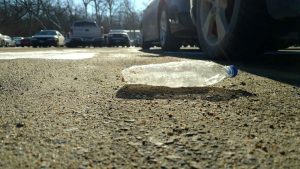By Lydia Hansen
Editor-in-chief
Lydia.Hansen1961@mb.rctc.edu
Everyone knows littering is bad. But why?
 “What may seem like a trash disposal shortcut is actually a contributing factor in water pollution and environmental degradation,” said Mark Faas, RCTC’s Physical Plant and Facilities Director. Deteriorating water quality on campus grounds is a problem he’s working to counteract.
“What may seem like a trash disposal shortcut is actually a contributing factor in water pollution and environmental degradation,” said Mark Faas, RCTC’s Physical Plant and Facilities Director. Deteriorating water quality on campus grounds is a problem he’s working to counteract.
Faas heads a committee of groundskeepers and faculty members working to maintain and preserve water quality in the four storm water ponds on campus grounds. The ponds are legally identified as municipal separate storm sewer systems (MS4’s), making it RCTC’s responsibility to meet quality standards and combat pollution throughout the grounds drainage system.
To date, RCTC has maintained acceptable levels of water quality.
While compliance with state and Federal regulations is partly responsible for the committee’s efforts, Faas also said that it’s part of a larger goal to maintain campus excellence.
“We’re an educational institution. We should be on the forefront of things. We should be exceptional.”
One of the primary sources of pollution Faas identified is the sand and salt applied to slippery roads and parking lots. Spring thaws and runoff from melting snow cause these to collect in concentrated levels in the campus ponds.
Additionally, rainfall throughout the year washes pesticides, herbicides, and any trash or litter dumped on roadsides or dropped on the ground into the ponds. This increases the concentration of nutrients like nitrogen or phosphorus as well as harmful chemicals.
Several methods are employed to counteract and monitor this pollution. Frequent testing provides data on current pollutant levels. Drainage through various inlets and outlets is also closely monitored to prevent flooding or stagnation.
Faas emphasized the importance of education and student participation in improving storm water quality on campus grounds as part of achieving excellence.
 “If we can get students involved and take ownership, I think we can get so much more done,” Faas said.
“If we can get students involved and take ownership, I think we can get so much more done,” Faas said.
After byproducts of grounds maintenance methods, the second greatest source of pollutants is student-generated waste. Engine fluids from leaky vehicles or simple trash can cause major problems once they enter the ponds. That impact is not easy or simple to remedy.
The simplest fix, then, is prevention, which means realizing the greater environmental impact of every piece of litter.
“It’s important that you pick up your garbage,” Faas said. “Watch what you’re throwing out of your car. If you see something, pick it up. It goes a long way.”
